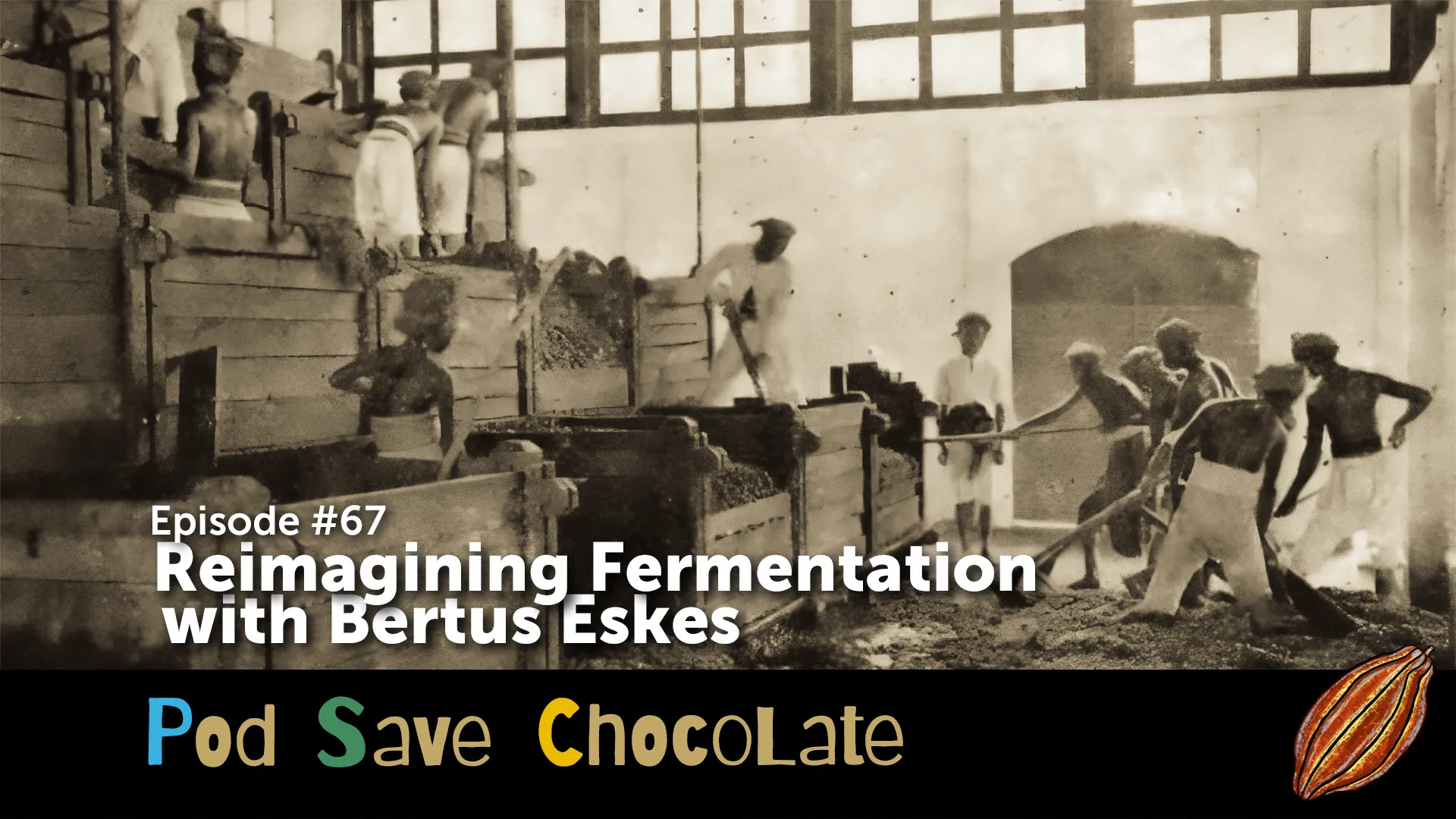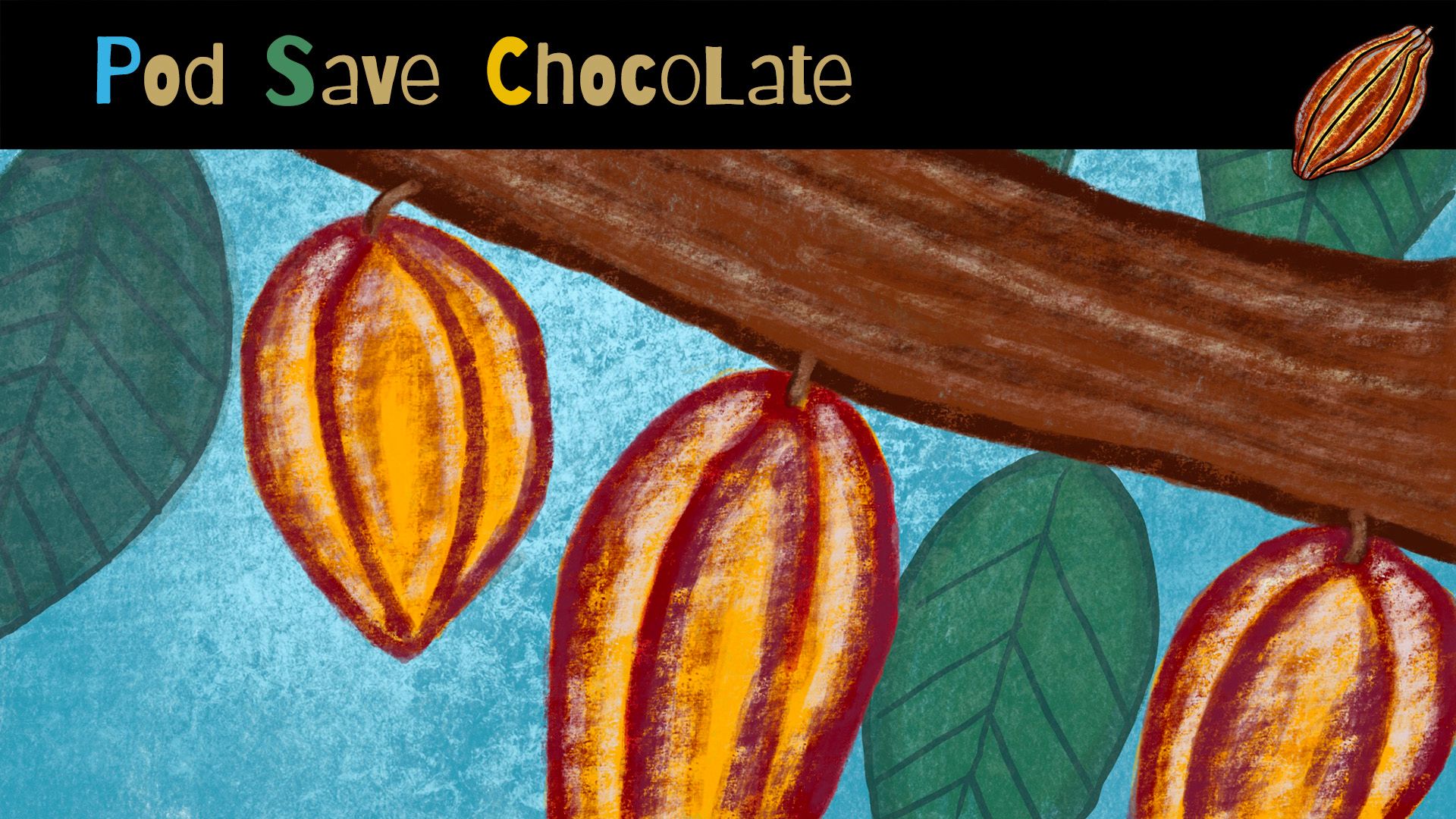Reimagining Fermentation | #PodSaveChocolate Ep67

Episode 67 of #PodSaveChocolate is dedicated to an interview with Bertus Eskes – an innovator in cacao fermentation techniques as witnessed by his TropMix and Anima fermentation methods that include understanding the role of cacao pulp and the flavor potential of cacao and finished chocolate.
When and Where to Watch
Watch on YouTube, LinkedIn, or Facebook to comment and ask questions live during the episode. The links to all three platforms are:

Click to watch on YouTube in a new tab or window. Please subscribe (free!) to the @PodSaveChocolate YouTube channel, like this video, comment, and share to help grow the #PSC community.\

This LINKEDIN link is shareable.

This FACEBOOK link is also shareable.
Episode 67 Overview
In this episode of #PodSaveChocolate, cacao fermentation visionary and maverick Bertus Eskes and I will be discussing his inspiration, journey, successes, and the challenges faced convincing “Big Chocolate” that they’ve been fermenting wrong for over 100 years (and smallholder farmers for hundreds and hundreds more).
Why? Because Bertus believes that:
- All cacao, if fermented using his techniques, can be used to make fine-flavor chocolate;
- That the distinction between commodity/bulk cacao and cacao fino y de aroma is a historical artifact that we need to move beyond; and
- That modern processing techniques such as alkalization, which destroys the nutritional profile of cocoa products, are entirely unnecessary.
Background
There is no clear understanding of when fermenting cacao became a common practice.
In the places where cacao (Ecuador) and chocolate consumption (Mayan and pre-Maya Mesiamerica) originated, neither archaeological nor documentary evidence provides solid clues as to when the practice began. Even today in places like the State of Tabasco in Mexico cacao lavado (washed, unfermented) cacao is more prevalent than “well-fermented” cacao.
As the featured photo in this post shows, box fermentation where the boxes are arranged in a “cascade,” has been around for over 100 years. Well before this, individual cacao farmers would routinely heap ferment whatever amount of fresh cacao they harvested in banana leaf cocoons.
Until recently, protocols for fermenting cacao were rooted in history and tradition. Everyone “knows” that you needed to ferment for between three and seven days (depending on varietal phenotype), turning the fermenting seeds at intervals to introduce air to move from “anaerobic” to “aerobic” fermentation and to ensure even fermentation to achieve an “80% well-fermented” distribution, as determined by a cut test.
Within the past two decades, our understanding of cacao fermentation has evolved through a focus on chemistry – a better understanding of genetics, understanding the chemistry of the pulp (especially brix and pH), understanding the pH of the fresh cotyledons, understanding the local microbiome (the presence and mix of yeast and bacteria species) that drive primary and secondary fermentation, measuring temperature changes, and more.
The primary goals of these efforts have been to develop protocols that steer and control the chemistry of the fermenting seeds and dried beans to achieve greater consistency and create the potential for unique flavors in finished chocolate.
But is that the only way – or even the best way – to improve fermentation?
My guest today, Bertus Eskes, suggests there are other – better – ways to reimagine fermentation guided by a careful analysis of cacao pulp. Eskes is the innovator behind the TropMix, Tradima, and Anima fermentation methods. (These are described in the free-to-download PDF, click on the card below.)
Questions?
If you have questions or want to comment, you can do so live during the episode or, if you are a ChocolateLife member, you can add them in the Comments below at any time.
Episode Hashtags and Related Accounts to Follow
#TropMix #Tradima #Anima
#Fermentation #Ferment #Fermented
#cocoa #cacao #cacau
#chocolate #chocolat #craftchocolate
#PodSaveChocolate #PodSaveChoc
#LaVidaCocoa #TheChocolateLife
Future Episodes
None scheduled when this post was published.
#PodSaveChocolate and #TheChocolateLifeLIVE Archives
To read an archived post and find the links to watch archived episodes, click on one of the bookmark cards, below.



Audio-only podcasts
Become a Premium ChocolateLife Member!
| These offers are available to free members, so subscribe above then click one of the following links. | |
|---|---|
| Team TCL Member Monthly membership | First 2 months FREE (save $10/yr) |
| Team TCL Leader Monthly membership | First 2 months FREE (save $30/yr) |




